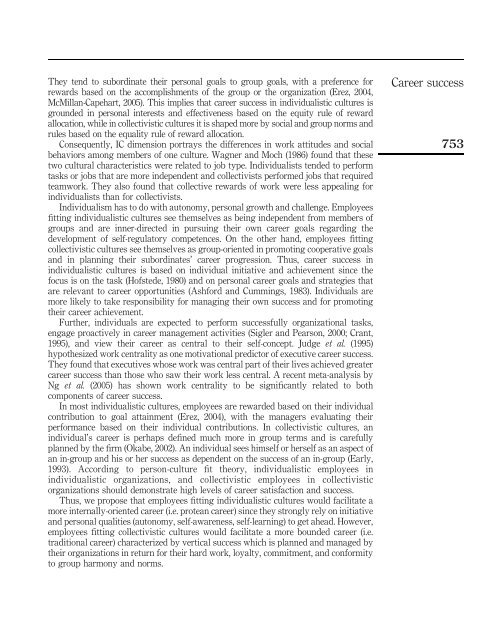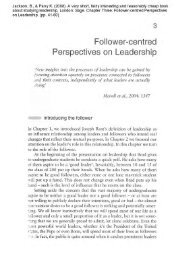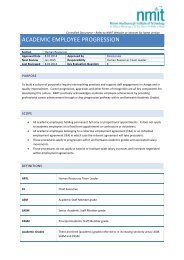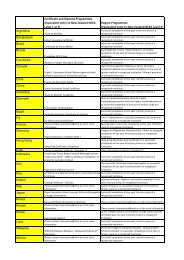Career success - 2007.pdf
Career success - 2007.pdf
Career success - 2007.pdf
Create successful ePaper yourself
Turn your PDF publications into a flip-book with our unique Google optimized e-Paper software.
They tend to subordinate their personal goals to group goals, with a preference forrewards based on the accomplishments of the group or the organization (Erez, 2004,McMillan-Capehart, 2005). This implies that career <strong>success</strong> in individualistic cultures isgrounded in personal interests and effectiveness based on the equity rule of rewardallocation, while in collectivistic cultures it is shaped more by social and group norms andrules based on the equality rule of reward allocation.Consequently, IC dimension portrays the differences in work attitudes and socialbehaviors among members of one culture. Wagner and Moch (1986) found that thesetwo cultural characteristics were related to job type. Individualists tended to performtasks or jobs that are more independent and collectivists performed jobs that requiredteamwork. They also found that collective rewards of work were less appealing forindividualists than for collectivists.Individualism has to do with autonomy, personal growth and challenge. Employeesfitting individualistic cultures see themselves as being independent from members ofgroups and are inner-directed in pursuing their own career goals regarding thedevelopment of self-regulatory competences. On the other hand, employees fittingcollectivistic cultures see themselves as group-oriented in promoting cooperative goalsand in planning their subordinates’ career progression. Thus, career <strong>success</strong> inindividualistic cultures is based on individual initiative and achievement since thefocus is on the task (Hofstede, 1980) and on personal career goals and strategies thatare relevant to career opportunities (Ashford and Cummings, 1983). Individuals aremore likely to take responsibility for managing their own <strong>success</strong> and for promotingtheir career achievement.Further, individuals are expected to perform <strong>success</strong>fully organizational tasks,engage proactively in career management activities (Sigler and Pearson, 2000; Crant,1995), and view their career as central to their self-concept. Judge et al. (1995)hypothesized work centrality as one motivational predictor of executive career <strong>success</strong>.They found that executives whose work was central part of their lives achieved greatercareer <strong>success</strong> than those who saw their work less central. A recent meta-analysis byNg et al. (2005) has shown work centrality to be significantly related to bothcomponents of career <strong>success</strong>.In most individualistic cultures, employees are rewarded based on their individualcontribution to goal attainment (Erez, 2004), with the managers evaluating theirperformance based on their individual contributions. In collectivistic cultures, anindividual’s career is perhaps defined much more in group terms and is carefullyplanned by the firm (Okabe, 2002). An individual sees himself or herself as an aspect ofan in-group and his or her <strong>success</strong> as dependent on the <strong>success</strong> of an in-group (Early,1993). According to person-culture fit theory, individualistic employees inindividualistic organizations, and collectivistic employees in collectivisticorganizations should demonstrate high levels of career satisfaction and <strong>success</strong>.Thus, we propose that employees fitting individualistic cultures would facilitate amore internally-oriented career (i.e. protean career) since they strongly rely on initiativeand personal qualities (autonomy, self-awareness, self-learning) to get ahead. However,employees fitting collectivistic cultures would facilitate a more bounded career (i.e.traditional career) characterized by vertical <strong>success</strong> which is planned and managed bytheir organizations in return for their hard work, loyalty, commitment, and conformityto group harmony and norms.<strong>Career</strong> <strong>success</strong>753
















